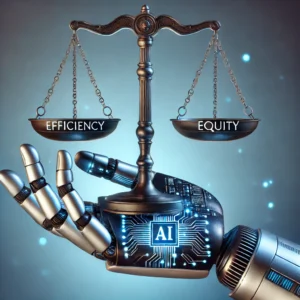
If you’ve ever scrolled through a social feed and stumbled upon a quirky chatbot dishing out financial tips, you’ve already encountered a simpler form of robo-advisory technology. Now imagine a similar AI-driven system giving suggestions on government budgets, healthcare reforms, or immigration policies. Intriguing, right? That’s precisely what some researchers and policymakers are experimenting with as we glide into 2025. These digital advisors—often referred to as Robo-Advisors—first made their mark in the financial sector, but they’re rapidly extending their reach into the realm of public policy.
So here’s the million-dollar (or perhaps million-line-of-code) question: can these algorithmic wizards truly provide unbiased, data-driven policy recommendations that outshine human policymaking’s flaws and biases? Let’s dive into the complexities of Robo-Advisors for Policy Making, the hopes and hype surrounding them, and the pressing concerns about whether we’re handing too much power to the AI realm.
Table of Contents
- The Rise of AI-Driven Policy Advisors
- Government Stances: Encouragement and Skepticism
- Political Headlines & Surprising Debates
- Behind the Scenes: Research Labs and Scientific Findings
- Celebrity Endorsements: The Glamour or Gimmick?
- Older Generations: Trust, Doubt, and Social Shifts
- Youth Perspectives: Tech-Savvy Optimism with Caution
- Global Business & Revenue: Profit from Policy?
- FAQs on Robo-Advisors for Policy Making
- A Convoluted Yet Earnest Conclusion & CTA
The Rise of AI-Driven Policy Advisors
Where It All Began and Where We Are Now
Robo-advisors debuted in finance, promising simpler ways to manage personal portfolios. Over time, machine learning advanced so quickly that governments, nonprofits, and think tanks started pondering: “Could the same AI engines that rebalance someone’s stock portfolio also propose solutions for, say, a city’s rising homelessness?” According to an Investopedia overview of robo-advisors, these systems rely on complex algorithms that gather user data and automate recommendations—while continuously learning from incoming new data points.
From that financial springboard, enter the budding realm of policy-based robo-advisors. A city council or a government ministry might employ machine learning models to evaluate budget allocations or detect inefficiencies in public transport. The idea is to remove the emotional or partisan slant that human policymakers often bring. But is that really possible?
Data In, Data Out
An AI’s advice only holds water if the data fed into it is comprehensive and well-structured. Early adopters have confronted real challenges in scrounging up reliable data, dealing with ambiguous metrics, and aligning the AI’s “goals” with ethical or societal values. For instance, if the system sees cost-cutting as the prime objective, it might propose slashing healthcare subsidies or arts funding—perhaps ignoring the social fallout.
A study in Frontiers in Behavioral Economics (2024) highlights how biases can sneak into algorithmic models. The authors note that “algorithms can systematically marginalize certain demographic groups” if the data pool skews. That’s a sobering reminder that while robo-advisors might not have personal agendas, they can still inherit the prejudices hidden in the data provided by flawed human systems.
Government Stances: Encouragement and Skepticism
Officials’ Notes and Official Dreams
Governments worldwide have offered contrasting views on using robo-advisors for public policy. A prime example is Singapore, where digital governance is practically woven into everyday life—some local agencies have started pilot programs to automate a chunk of budget planning, especially in education. Over in the European Union, policymakers are drafting guidelines to standardize AI-based systems for public use, including clarifying liability if a policy suggestion goes disastrously wrong.
Meanwhile, documents from a few national ministries (some of which have been teased in press releases but not always shared in full detail) show a sense of excitement and caution. They welcome the potential to save tax dollars by streamlining complex bureaucratic tasks, but they also worry about the accountability conundrum. After all, if a robo-advisor recommends a detrimental policy, can we blame the AI?
A Future of “AI Government Boards”?
Some speculate that by 2030 or beyond, we might see specialized “AI boards” embedded in government agencies, analyzing data around the clock and drafting recommendations that lawmakers only need to tweak. Or perhaps we’ll see an integrated approach, where human experts remain in charge but heavily lean on AI-driven insights. Either way, it’s no secret that government interest is surging, even if legal frameworks lag behind.
Political Headlines & Surprising Debates
Robo-Advisors on the Public Stage
As we edge into 2025, political news outlets can’t resist sensationalizing the robo-advisor phenomenon. One day, a left-leaning newspaper might applaud these AI tools for “democratizing policy-making and eliminating corporate lobbying.” The next, a right-leaning tabloid might stoke fears that “unaccountable machines will replace elected officials.”
The real fireworks happen in parliamentary sessions or legislative debates. In a high-profile hearing in the United States, certain senators grilled an AI firm on potential discrimination embedded in their algorithms—citing a case where a welfare distribution model recommended more cuts in minority neighborhoods. Meanwhile, European politicians spar over data privacy concerns, as policy advisors might rely on huge data sets containing sensitive information about citizens’ incomes or health backgrounds.
The Public Reception
A portion of the population welcomes any innovation that might push politics beyond endless bickering. People fed up with gridlock are willing to trust an algorithm if it promises cost-efficient solutions. Others worry about losing the human touch and moral nuance. Policy isn’t just a math equation, after all; it deals with values and societal priorities that can’t always be boiled down to zeros and ones.
Behind the Scenes: Research Labs and Scientific Findings
Academics Crunch the Numbers, Then Argue Over Them
In dusty lab offices or cutting-edge AI incubators, researchers constantly refine the ways robo-advisors parse data, evaluate policy trade-offs, and spit out recommendations. A 2025 paper from the International Monetary Fund eLibrary highlights how AI-driven models can streamline macroeconomic analysis, quickly identifying inefficiencies that might take human analysts weeks or months to spot. If you’re a data nerd, it’s pretty thrilling.
But then you have a counterpoint in another research study that warns about “algorithmic illusions,” wherein a policy model looks flawless but fails to account for local cultural contexts or intangible human factors like fear, hope, or trust. These intangible factors can derail even the best-laid policy suggestions. Over at ResearchGate, scientists dissect the “Challenges of Robo-Advisors,” which include transparency, bias, and real-time data quality. Many emphasize the pressing need for robust regulatory frameworks to ensure that these AI tools enhance, rather than undermine, democracy.
The “Explainability” Dilemma
To be accepted by politicians and the public, policy advisors must clarify how they arrived at their conclusions. But modern AI systems—particularly deep learning models—are often described as “black boxes.” They churn through data with layers of complex computations that even their own creators struggle to explain. This opaqueness fuels distrust, making it hard for lawmakers, or everyday citizens, to accept recommendations at face value.
Celebrity Endorsements: The Glamour or Gimmick?
Star Power Meets Algorithmic Governance
In a headline that bordered on surreal, a globally recognized pop star once tweeted her excitement about “AI for justice,” endorsing the idea of robo-advisors to fix social inequalities. The tweet garnered millions of likes and spurred heated debates—some praising her for shining a spotlight on an emerging technology, others dismissing it as yet another shallow publicity stunt.
High-profile tech entrepreneurs have also weighed in. Elon Musk, known for bold proclamations, occasionally suggests that open-source AI for public policy might help ward off corruption. Meanwhile, certain Hollywood actors post Instagram stories praising AI’s “objectivity.”
Yet, behind the glitz, critics fear that celebrity endorsements can oversimplify complex issues or push governments into adopting half-baked solutions because, well, it’s trending. On the other hand, watchers of popular culture argue that star power might keep the conversation alive, ensuring broader awareness among younger audiences typically detached from policy wonkery.
When Fame Meets Policy
Not all celebrities handle the topic superficially. A few actually fund research labs or partner with think tanks, aiming to deepen their knowledge and produce meaningful policy proposals. Whether it’s philanthropic ambition or a genuine desire to shape a better world, these alliances sometimes spark real progress—especially if they bring fresh funding for pilot projects or specialized training for civil servants in AI literacy.
Older Generations: Trust, Doubt, and Social Shifts
“Back in My Day…” vs. “Let’s See What Works”
Talk to someone over 70, and you might hear them recall a time when big decisions emerged from face-to-face negotiations and handshake deals. The concept of a machine “advising” on national healthcare or education might seem like science fiction or, worse, a dystopian scenario. Some older folks worry about losing the human aspect—empathy, moral intuition, the intangible sense of compassion that theoretically shapes policy in a well-functioning democracy.
Others, especially retirees who keep up with technology, are surprisingly open-minded. They’ve seen how automation streamlined industries and improved daily life. So they reason: “If an AI can help my grandkids get a better education or save on taxes, why not?”
Bridging the Generation Gap
Communities and senior centers sometimes host workshops demonstrating how policy-focused AI systems function. The results can be comical or enlightening. A grandma might ask: “Does the robo-advisor know anything about old folks who can’t use smartphones?” The presenters might scramble to explain that, yes, social data can be integrated to tailor solutions for less digitally savvy populations. Occasionally, these dialogues reveal hidden biases or missing data segments, prompting system tweaks.
Youth Perspectives: Tech-Savvy Optimism with Caution
The Digital Natives Weigh In
For many young adults, AI is just another tool in a vast digital ecosystem. They already rely on algorithms for music suggestions, job searches, or dating app matches. So pivoting to AI-driven policy recommendations doesn’t necessarily freak them out—at least not in the same way it does older folks. Some see it as a natural extension of the data-driven decision-making that rules the modern world.
Yet, ironically, youth can also be the first to question who’s controlling the data. Gen Z activists often highlight that technology, while powerful, can replicate the same social inequalities if it’s designed without diverse perspectives. For instance, if the engineers and dataset curators lack representation from marginalized groups, the resulting policy suggestions might systematically ignore or disadvantage those communities.
Stirring Political Engagement
Another twist: the notion of a “virtual policy influencer” can galvanize the youth’s interest in politics—an area historically plagued by voter apathy in younger demographics. Online platforms might feature AI policy polls that let users see the immediate ramifications of certain legislative actions. This interactive approach might lure more young voters to engage or, at the very least, become curious about how laws are drafted.
Global Business & Revenue: Profit from Policy?
The Lucrative Market for AI Governance Tools
It’s not just governments and nonprofits eyeing robo-advisors; big tech firms and consulting giants see gold in them. After all, if an AI platform can be licensed to multiple agencies, that means recurring revenue streams. Some solutions are even pitched to corporations wanting to optimize their philanthropic strategies or corporate social responsibility. Why rely on guesswork when an algorithm can direct your charitable funds to the areas of greatest impact?
According to a ScienceDirect article, the global AI market in governance could skyrocket as more countries digitalize their bureaucracies. Consulting companies are rolling out “policy modules” that promise real-time analytics, risk assessment, and scenario simulations. But with big money at stake, critics suspect lobbying efforts could skew the “neutrality” of these systems. If a developer or corporate backer has certain interests—like encouraging privatization or protecting large industries—the “unbiased” recommendations might subtly push those agendas.
The Allure and the Warnings
Yes, robo-advisors can find cost-saving measures or identify growth opportunities in a municipal budget. But we must remain vigilant about potential conflicts of interest. Some worry that wealthy corporations might buy preferential “policy solutions,” overshadowing local voices or smaller businesses. While robust regulations might limit direct meddling, the gray areas remain substantial, especially given the global scale of AI innovation.
FAQs on Robo-Advisors for Policy Making
Your Burning Questions, Answered
- Are policy-based robo-advisors really unbiased?
They might reduce overt human biases, but they inherit biases from the data sets and algorithms they’re built on. So “unbiased” is a tricky term. - Could these AI tools replace politicians entirely?
That seems unlikely. Politics involves public trust, moral debates, and emotional intelligence that AI can’t fully replicate. However, they may complement politicians by providing data-driven insights. - What happens if a robo-advisor suggests a harmful policy?
Ultimately, human officials remain accountable. That said, liability issues are a hot topic, with some jurisdictions debating “AI accountability” laws. - Are older generations opposed to AI in policymaking?
Opinions vary widely. Some older folks embrace new tech if it can fix problems faster, while others worry it’s a step toward a cold, mechanistic society. - How do young activists feel about AI policy advisors?
They often appreciate the efficiency but demand transparency and diverse representation in how these tools are developed and deployed. - What’s the financial angle?
Corporations and tech developers see enormous profit in selling AI governance platforms, which raises ethical questions about undue influence or conflicts of interest. - Do celebrities matter in this debate?
Their endorsements can raise public awareness—though some are criticized for oversimplifying complex issues. A few well-informed stars fund research labs or partner with think tanks, providing significant impact beyond mere publicity. - Is there any international regulation?
We’re still in the early stages. Some global bodies are discussing guidelines, but comprehensive legal frameworks remain patchy at best.
A Convoluted Yet Earnest Conclusion & CTA
We live in a wild era where an AI algorithm that once helped you optimize your retirement portfolio can now propose ideas for public housing, national healthcare, or even foreign policy. The dream is that Robo-Advisors might sidestep the petty squabbles, pork-barrel politics, and emotional manipulation that humans can’t seem to shake. The danger is that these digital oracles could perpetuate hidden biases, override moral nuances, or funnel decisions toward corporate or elitist interests.
So, what should we do? At a minimum, we need:
- Transparency: Clear explanations of how AI recommendations are formed.
- Oversight: Regulatory bodies that keep tabs on the data sets and algorithms.
- Public Engagement: Citizens must have a say, or at least an understanding, of how these automated proposals come about.
- Innovation: Keep refining the technology so it genuinely helps societies, rather than just making a quick buck for big tech.
Fancy trying to shape the future? You might consider:
- Educating yourself about the nuts and bolts of AI.
- Speaking up at local councils or community forums where AI-based proposals are on the table.
- Supporting legislative efforts that push for robust, ethical frameworks for AI governance.
After all, building a fair, forward-thinking world doesn’t mean ditching technology. It means using it wisely—ensuring that our best innovations are guided by something more profound than raw efficiency or profits.





